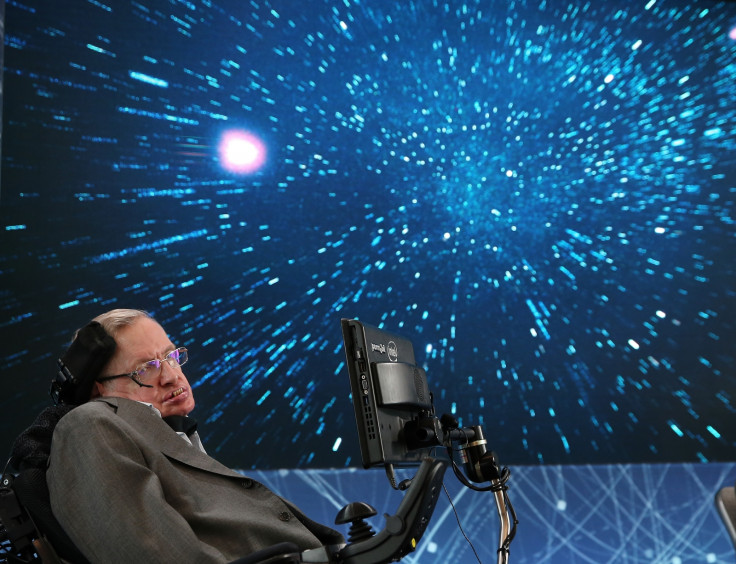'Where there is life there is hope' – Stephen Hawking shares incredibly inspiring life lessons
Hawking reportedly gave a stirring talk at the Cambridge Union titled "A Brief History of Mine".
Professor Stephen Hawking is well-known for his predictions about the dangers of AI (artificial intelligence) and the inevitable end of life as we know it on Earth. However, on Tuesday (21 November), the renowned theoretical physicist and cosmologist reportedly gave a rare and stirring talk titled "A Brief History of Mine," sharing incredibly inspiring life lessons with students at the Cambridge Union.
In the rare light-hearted speech, Hawking reportedly told students to "look up at the stars and not down at your feet". The celebrated scientist also spoke about his childhood, his life at University, how he dealt with being diagnosed with motor neurone disease, the importance of persevering in the face of adversity and more, Cambridge News reported.
Here are the highlights Hawking's speech:
Confidence can apparently help you talk your way to success with little effort
Hawking began the talk by joking about how he made it through his early academic life at Oxford University as an undergraduate student by doing "next to no work". He said that he achieved a first class degree, not by hard work, instead by negotiating with his professors.
"At Oxford you were supposed to be brilliant without effort or accept your limitations and get a fourth class degree," he said, adding that his course "made it particularly easy to avoid work".
"Because of my lack of work I had planned to get through the final exam by doing problems in theoretical physics and avoiding questions that require factual knowledge," Hawking said. "But I didn't sleep the night before the exam because of nervous tension and so I didn't do very well. I was on the borderline between a first and second class degree and I had to be interviewed by the examiners to determine which grade I should get."
Recalling the interview, Hawking continued, "In the interview they asked me what were my future plans. I said I wanted to do research - if they gave me a first I would go to Cambridge. If I only got a second I would stay at Oxford.
"They gave me a first."
"Where there is life there is hope"
Professor Hawking spoke about the importance of perseverance in the face of adversity, sharing his struggle about dealing with being diagnosed with motor neurone disease at the young age of 21.
Hawking told students how the Christmas after he joined Cambridge he went home, only to be diagnosed with the life-altering disease.
"My mother took me to the doctor. I spent weeks in hospital and had many tests. They never actually told me what was wrong, but I guessed it was pretty bad so I didn't want to ask," Hawking said. "In fact my doctor washed his hands of me and I never saw him again. He felt nothing could be done for me. So my father became my doctor.
"At first I became depressed. There didn't seem to be any point working on my PhD because I didn't know if I would live long enough to finish it."
However, Hawking said that when faced with the possibility of an early death, he realised "life is worth living and there are lots of things you want to do." His message to students about dealing with hardship was - "Where there is life there is hope".
Hawking said that meeting and getting engaged to Jane "lifted my spirits and I began to work hard on my PhD. And I enjoyed it".
"However difficult life may seem there is always something you can do and succeed at," Hawking added. "It matters that you don't just give up."

A glorious time to be alive and doing research in theoretical physics
Hawking ended his talk by reminding students, "We live in a universe governed by rational laws that we can discover and understand."
He added that the future will likely see the scientific community conduct numerous "ambitious experiments" involving supercomputers and gravitational waves, that will help us "better understand our position in the universe" and even likely allow scientists to "look right back into the heart of the Big Bang".
However, keeping true to his typical dire predictions, Hawking told students that "We must also continue to go into space for the future of humanity. I don't think we will survive another thousand years without escaping beyond our planet."
Hawking ended the talk on a lighter note, telling the audience that he was happy to have contributed to humanity's understanding of the ever-evolving universe.
"It has been a glorious time to be alive and doing research in theoretical physics. I want to share my excitement and enthusiasm about this. So remember to look up at the stars and not down at your feet," Hawking said. "Try to make sense of what you see and wonder how that makes the universe exist. Be curious."






















